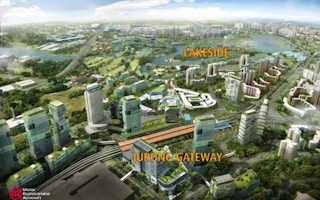Singapore’s upcoming Jurong Lake District has won a grant from technology giant IBM which will help city planners design a greener, community-oriented urban centre, the Urban Redevelopment Authority announced Friday.
The planning authority, together with the Economic Development Board (EDB) and IBM said in a joint statement that the Jurong Lake District in western Singapore had earned a spot in IBM’s Smarter Cities Challenge programme, which would lead to improved city services and better use of resources.
The Smarter Cities Challenge is a US$50 million programme started in 2011 by IBM to provide expertise and technology to cities seeking to solve urban problems in areas such as transportation, job skills development, air quality, education and urban planning.
IBM’s Singapore managing director, Janet Ang, said that the winning cities were chosen because their leaders showed a strong commitment to “put in place the changes needed to help the city make smarter decisions”.
“We look forward to working closely with the Singapore team to create an innovative approach to city building that will help Singapore’s goal of maintaining our global city status,” she added.
The Singapore government has plans to make the 360 hectare Jurong Lake District the largest commercial and mixed-used district outside of the current central business district. Its rejuvenation is part of a broader URA decentralisation strategy for Singapore to balance economic growth, while reducing commuting and providing a higher quality of life for its residents.
According to a URA master plan released in 2008, the area encompassing Jurong Gateway near the Jurong East MRT station and the Jurong Lake district will lead Singapore’s economic growth for the next 10 to 15 years. It will also bring additional jobs and commerce to the western part of the island.
URA has designated the area as a smart district, meaning it should use land and resources more efficiently, and provide a better environment for its workers, residents and visitors.
For example, new developments in the Jurong Gateway Precinct are required to meet one of Singapore’s highest green building ratings, known as Green Mark Gold Plus. And building developers are required to replace any greenery lost during construction.
Built around the Jurong East transport hub, the area will also link residential developments, commercial areas, parks and other leisure amenities, for easy access.
Beginning in the second half of this year, IBM’s Smarter Cities Challenge team will spend three weeks working with URA, EDB, and other local agencies to identify planning issues that can be solved using the team’s expertise. Non-profit organisations and small businesses will also add to the planning process.
URA chief executive Ng Lang said, “URA has been paying close attention to designing our new growth areas to be liveable, environmentally-friendly, and inclusive.”
Working with IBM’s team would help strengthen these goals for the Jurong Lake District, he added.
Singapore is one of 33 cities awarded the grant this year. In total, 100 cities will receive the grant over the three-year programme, which is sponsored by IBM’s Corporate Citizenship Programme and its International Foundation.
Other award recipients in the Asia Pacific region include:
- Ahmedabad, India
- Cheongju, Korea
- Chonburi, Thailand
- Da Nang, Vietnam
- Geraldton, Australia
- Ishinomaki, Japan
- New Taipei City, Taiwan
- Nanjing, China
- Pune, India
Rather than a cash grant, recipients receive the equivalent of about US$400,000 in advisory services and technology from teams of IBM experts.
Previous award winner Ho Chi Minh City in Vietnam, used its grant to find ways to improve the city’s systems for food safety, water management, transportation and developing job skills. After the three-week team study, city managers created pilot projects to use technology to monitor those systems so they would have better information for decision-making.
URA told Eco-Business that the IBM team’s work areas for the Jurong Lake District would not be determined until the team sat down with local agencies later this year to identify the most effective use of resources.
EDB managing director Beh Swan Gin said that the Jurong Lake District project was a chance to promote Singapore’s vision as a ‘living laboratory’ for collaboration between government, businesses and research groups.
“As one of Asia’s most liveable cities, Singapore is leading the way in sustainable development by boldly tackling challenges common across many of today’s urban centres, especially in Asia,” he added.

















